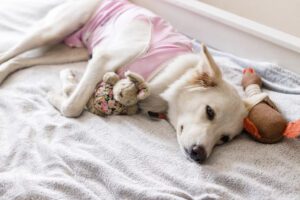Dog Spay Recovery Process
When you decide to spay your dog, you take a significant step towards their health and happiness. At Animal Family Veterinary Care Center, we’re dedicated to guiding you through the dog spay recovery process. Our focus is to ensure your beloved dog recovers smoothly and comfortably. If you have questions or concerns at any point, please contact us at (563) 391-9522 for more information or to make an appointment.

The Importance of Spaying Your Dog
Spaying, the surgical removal of a female dog’s reproductive organs, is more than just a procedure to prevent unwanted puppies. It’s a proactive step towards preventing serious health issues like uterine infections and breast cancer. By choosing to spay your dog, you’re potentially extending their life and enhancing their quality of life.
Health Benefits
Along with helping to control the pet population, spaying also offers significant health benefits. It reduces the risk of certain cancers and eliminates the possibility of life-threatening infections. It also eliminates the heat cycle and can minimize or prevent troublesome behaviors for your pet, such as roaming, vocalizing, and mounting (yes, females can do this too). Spaying is a preventative measure that can lead to a healthier, longer life for your dog.
Post-Spay Surgery: What to Expect for Your Dog
After your dog has been spayed, understanding the recovery process is key to helping them heal. Initially, your dog might be sleepy or less responsive when you bring them home due to the anesthesia. This is entirely normal and should gradually subside within 24 hours. You might notice a lack of appetite, but it should return as they recover. It’s also common for dogs to be less active or show less interest in playing during the first few days post-surgery.
Physical Changes and Behavior
Your pet’s surgery site may appear swollen, and it’s essential to monitor this area for any signs of infection or irritation. These include redness, inflammation, hardening of the skin, and other discoloration around the area. Check for broken sutures, too, as this can sometimes happen if a dog chews at their incision (surgical incisions can cause itching as they heal). It’s important to prevent your dog from licking and chewing at their incision site to allow for proper healing. See the next section for tips.
Helping Your Dog Through Recovery
As your dog recovers at home from their surgery, they’ll need your ongoing support. You can assist by creating a peaceful environment. A cozy bed in a quiet room away from noise and activity can make a big difference, and if you have other pets and/or kids at home, try to keep them away from your recovering dog to prevent rough play or disturbance.
Activity Restrictions and Comfort Measures
Limit your dog’s activities, especially those involving jumping or running, to avoid stress on the surgical site. Gentle, short walks on a leash are fine, but keep them calm and controlled. Provide soft bedding and consider extra padding for more comfort. You can also use a dog-specific recovery suit, a onesie, an old T-shirt, or an e-collar to prevent your dog from licking or biting the stitches. It’s extremely important to keep your dog’s incision site dry and clean.
Things to Watch for During Your Dog’s Spay Recovery
Be sure to watch for certain signs that might indicate complications in your dog’s recovery. These include:
- Whimpering/vocalizing (may be a sign of pain)
- Redness, bruising, inflammation, swelling, seepage, or pus around the incision
- Prolonged/excessive lethargy
- Refusing to eat or drink for more than 24 hours
If you notice any of these signs, contact Animal Family Veterinary Care Center right away at (563) 391-9522.
Encouraging Proper Healing
The right care can significantly influence your dog’s healing process. Here’s how you can help:
Nutrition, Hydration, and Medication
Ensure your dog has access to fresh water and encourage them to drink. Stick to the diet recommended by your veterinarian and avoid giving table scraps or treats that could upset their stomach. If medications or antibiotics are prescribed, follow the dosage instructions carefully and complete the full course, even if your dog appears to be feeling better.
Environmental Factors
Keep your dog indoors, especially in extreme weather, to avoid unnecessary stress on their body. Ensure the environment is calm and avoid changes that might cause anxiety or excitement.
Follow-Up Care
It’s essential to attend any scheduled follow-up appointments with your veterinarian. These checkups allow the vet to monitor the healing process and address any concerns you might have promptly.
We’re Here to Help with Your Dog’s Spay Recovery
Remember, each dog’s recovery can vary. While some may bounce back quickly, others may take a bit longer. Patience and attentive care during this time are vital. By following these guidelines and keeping a close eye on your dog’s behavior and healing, you’re providing them with the best chance for a smooth and speedy recovery. If you notice anything concerning during your dog’s recovery, or if you have any questions, we’re here to help. Call us at (563) 391-9522 for assistance or to schedule a follow-up appointment.
Recent Posts
About Us
Animal Family Veterinary Care offers an extensive range of services all in one place, so we can meet your pet’s needs in almost every situation. Our veterinarians in Davenport treat dogs and cats because every pet is unique and important.